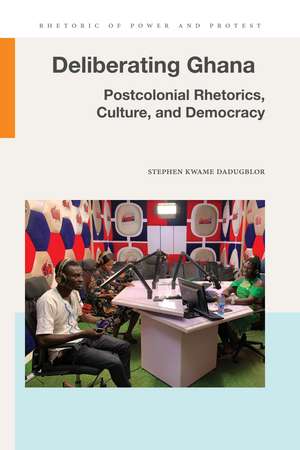Deliberating Ghana: Postcolonial Rhetorics, Culture, and Democracy: Rhetoric & Public Affairs
Autor Stephen Kwame Dadugbloren Limba Engleză Paperback – mai 2025
Din seria Rhetoric & Public Affairs
-
 Preț: 341.01 lei
Preț: 341.01 lei -
 Preț: 259.44 lei
Preț: 259.44 lei - 5%
 Preț: 148.00 lei
Preț: 148.00 lei -
 Preț: 408.40 lei
Preț: 408.40 lei -
 Preț: 300.53 lei
Preț: 300.53 lei -
 Preț: 277.68 lei
Preț: 277.68 lei -
 Preț: 171.63 lei
Preț: 171.63 lei -
 Preț: 169.14 lei
Preț: 169.14 lei -
 Preț: 221.28 lei
Preț: 221.28 lei - 13%
 Preț: 344.48 lei
Preț: 344.48 lei -
 Preț: 180.86 lei
Preț: 180.86 lei -
 Preț: 164.31 lei
Preț: 164.31 lei - 13%
 Preț: 330.65 lei
Preț: 330.65 lei -
 Preț: 151.17 lei
Preț: 151.17 lei -
 Preț: 305.81 lei
Preț: 305.81 lei -
 Preț: 154.36 lei
Preț: 154.36 lei - 13%
 Preț: 410.06 lei
Preț: 410.06 lei -
 Preț: 123.73 lei
Preț: 123.73 lei -
 Preț: 332.55 lei
Preț: 332.55 lei -
 Preț: 127.81 lei
Preț: 127.81 lei - 13%
 Preț: 442.80 lei
Preț: 442.80 lei -
 Preț: 362.72 lei
Preț: 362.72 lei - 13%
 Preț: 344.56 lei
Preț: 344.56 lei - 13%
 Preț: 331.96 lei
Preț: 331.96 lei - 13%
 Preț: 330.72 lei
Preț: 330.72 lei - 13%
 Preț: 331.55 lei
Preț: 331.55 lei - 13%
 Preț: 334.52 lei
Preț: 334.52 lei - 13%
 Preț: 331.55 lei
Preț: 331.55 lei - 13%
 Preț: 380.96 lei
Preț: 380.96 lei -
 Preț: 262.76 lei
Preț: 262.76 lei -
 Preț: 270.62 lei
Preț: 270.62 lei - 13%
 Preț: 331.14 lei
Preț: 331.14 lei -
 Preț: 248.30 lei
Preț: 248.30 lei -
 Preț: 208.43 lei
Preț: 208.43 lei - 13%
 Preț: 332.20 lei
Preț: 332.20 lei
Preț: n/a
Nou
Disponibilitate incertă
Doresc să fiu notificat când acest titlu va fi disponibil:
Se trimite...
Preluare comenzi: 021 569.72.76
Specificații
ISBN-13: 9781611865325
ISBN-10: 1611865328
Pagini: 234
Dimensiuni: 152 x 229 mm
Greutate: 0.45 kg
Editura: Michigan State University Press
Colecția Michigan State University Press
Seria Rhetoric & Public Affairs
ISBN-10: 1611865328
Pagini: 234
Dimensiuni: 152 x 229 mm
Greutate: 0.45 kg
Editura: Michigan State University Press
Colecția Michigan State University Press
Seria Rhetoric & Public Affairs
Recenzii
“Linking cultural rhetorics, African politics, and deliberation, Dadugblor examines court challenges to Ghana’s 2012 election and delivers impressive, innovative analyses of documentary evidence, digital publics, genre politics, public commentary, and the tensions between freedom of speech and citizen relationships. In doing so, he expands our knowledge of deliberation as a global, democratic activity, focusing our attention on its traditions and foundations within cultures. Dadugblor’s exploration of the local demonstrates the limitations of Western norms, as it examines the complex vectors—social, historical, political, economic, legal—that create cultural imaginaries and more capacious visions of the public sphere. This book has vital implications for cultural, digital, and African rhetorics, as well as deliberative, democratic, and postcolonial theory.” —Arabella Lyon, author of Deliberative Acts: Democracy, Rhetoric, and Rights
Notă biografică
Stephen Kwame Dadugblor is an assistant professor in the School of Journalism, Writing, and Media at the University of British Columbia, Vancouver. He completed his PhD in English, with a concentration in rhetoric, at the University of Texas at Austin, and his dissertation was nominated for the Outstanding Dissertation Award. He was also awarded the 2021 James L. Kinneavy Prize for Scholarship in Rhetoric and Composition. His research focuses on rhetoric, democratic deliberation, postcolonial/decolonial rhetorics, and digital media, with specific interest in the ways that African societies draw upon cultural deliberative resources to refashion and decolonize their social and political worlds in the aftermath of colonialism.,
Descriere
In the early 2010s electoral disputes in Ghana garnered global attention and raised questions concerning the nature and future of democratic practice in postcolonial countries. In this new work, these disputes are examined through an analysis of courtroom discourse, social media artifacts, documentaries, parliamentary records, and op-eds. Dadugblor offers a fresh perspective on foregrounding a society’s indigenous knowledge and the messiness of its socio-political and rhetorical traditions to intervene in debates about the politics of knowledge production.
